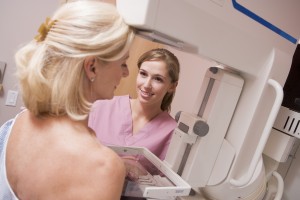We live in a society that chooses early cancer detection over prevention and calls it a cure. I can sum it up no more clearly than that.
I am not advocating that mammography (and PSA testing while we’re at it…) is a bad thing. Certainly there are cases where the very first hint of anything was detected on a routine mammography. But this is not normally the case. For this we need to differentiate “mammography-detected” from “mammography-confirmed” results. In mammography-confirmed cases, this is where a suspicious lump or mass was detected by breast self exam or at the OB’s office. The mammography is then ordered just to further evaluate the mass.
However, this usually leads to the mammography getting the “credit” for detecting the mass although this is not really what happened. The pro-mammography people then chalk up another one for mammography saving lives.
For years, mammography reigned supreme as THE method to “prevent” breast cancer and saves lives. No one would question something so powerful and amazing for women’s health. Until someone did.
It was not until research started to emerge suggesting that many small tumors (most often of the DCIS-type) will actually resolve on their own. Without treatment.
That then raised the question of over detection and over treatment. That’s when all heck broke loose. When the dust settled around the studies looking at how often breast cancer was overdiagnosed, leading to massive levels of overtreatment, costs and lifetimes of emotional and treatment-related scars, those who were willing to accept the data realized that we were seeing the downfall of a generation of “prevention.”
However, the industries that were built on breast cancer detection and treatment were a wee bit loath to accept this new data, even going as far as to discount the USPTF’s recommendation for women 40-50 years of age to forgo routine mammography.
Just in case you’re still a solid believer in mammography and how much it benefits society and how this single intervention has completely turned the tide for women dying of breast cancer, let me present this particular study. In it, researchers looked at varying rates of mammography across the US to see if this had an impact on breast cancer survival rates.
In other words, if mammography is slashing breast cancer mortality rates and saving lives, than the areas of the country that have higher rates of mammography screening should have lower breast cancer mortality rates. Here’s what they found in this large study of 16 million women (40 years or older):
- As expected, the areas of the country that had higher rates of screening had higher rates of breast cancer incidence.
- However, screening rates had no impact on breast cancer mortality rates.
- For ever 10% increase in screening rates there were 16% more breast cancer diagnoses but no corresponding drop in breast cancer deaths.
- More screening led to higher rates of small breast cancers (≤2 cm) but there was no corresponding decrease in large breast cancers (>2 cm) found (in other words–more screening didn’t lead to cancers being detected earlier instead of advancing and being found at a later stage).
To put it more plainly, there is consistent evidence that mammography does NOT save lives, but does lead to the overdiagnosis of small breast “cancers” (keep in mind that DICS is not actually cancer, but really a pre-cancerous lesion).
All of this focus over the decades has been on mammography for “prevention” instead of educating the general public on how powerful lifestyle is for breast cancer prevention. I got a text from one of my colleagues just today saying that she was portrayed as the “bad guy” in a conversation when she suggested that lifestyle played a role in breast cancer.
In today’s day and age, with literally hundreds (if not thousands) of peer-reviewed medical research studies confirming links between breast cancer and lifestyle, this lack of knowledge on the part of the public is inexcusable. Period. And yet every person who is unaware that lifestyle plays a role in breast cancer will proudly stand up and declared that mammography saves lives and is the strongest form of breast cancer “prevention” known.

